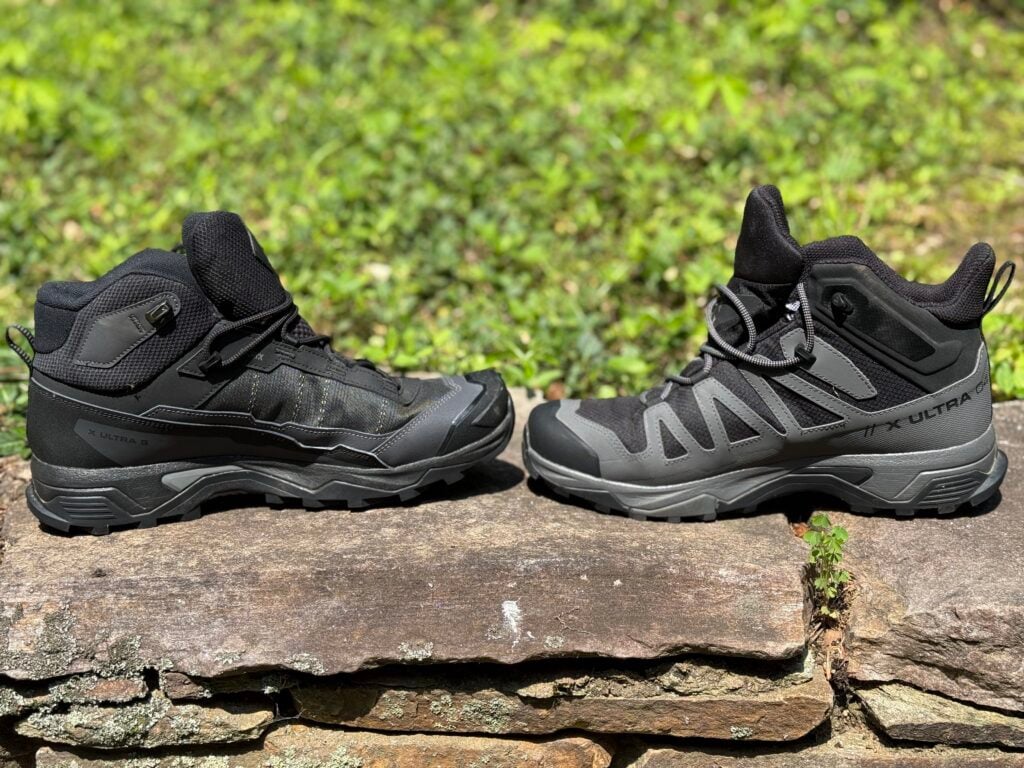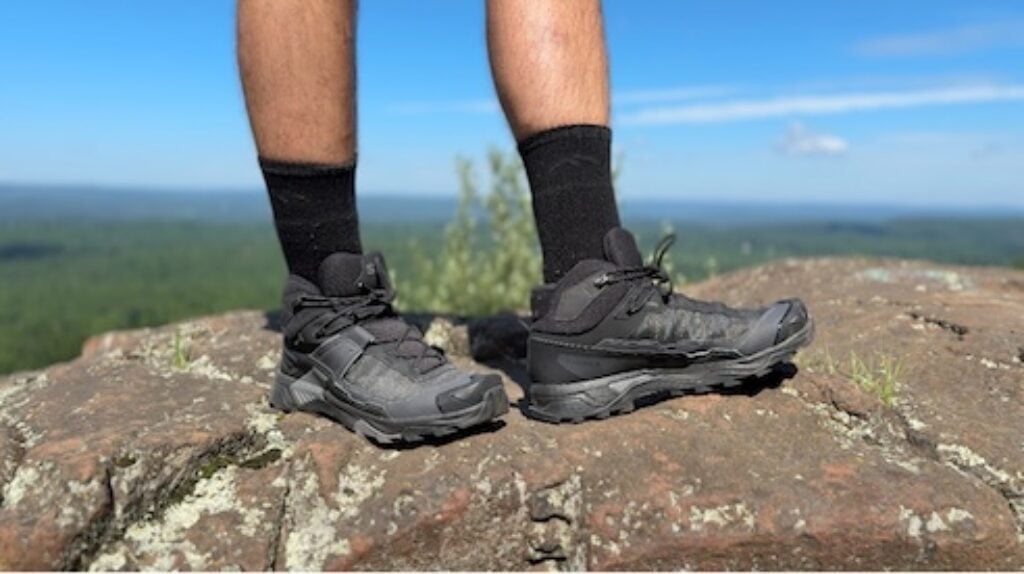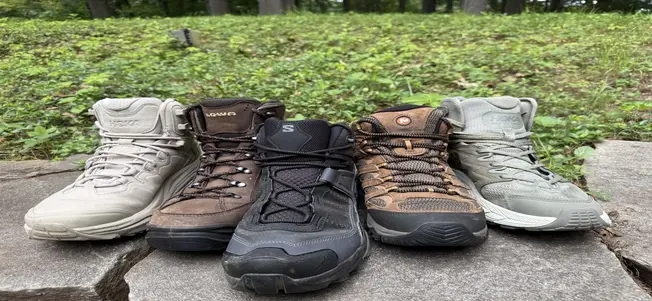What Are Lightweight Walking Boots?
Lightweight walking boots represent a revolutionary approach to hiking footwear, typically weighing under 2 pounds per pair (less than 500g per boot). Unlike traditional heavy leather boots that can weigh 3+ pounds, these modern marvels use advanced materials and construction techniques to deliver protection without the weight penalty that causes fatigue on long trails.
The key difference lies in their construction philosophy. Traditional walking boots prioritize maximum durability and support through thick leather uppers and rigid midsoles. Lightweight walking boots achieve similar performance through synthetic materials, strategic reinforcement, and innovative design that eliminates unnecessary bulk while maintaining essential protection.
Weight Categories Explained
- Ultralight: Under 1.5 lbs (680g) per pair - Best for fast hiking and trail running
- Lightweight: 1.5-2 lbs (680-900g) per pair - Ideal balance of weight and protection
- Traditional: 2.5+ lbs (1134g+) per pair - Maximum durability for heavy loads
Modern lightweight walking boots excel in breathability, flexibility, and reduced break-in time compared to their heavier counterparts. They're particularly beneficial for day hiking, fast-packing, and multi-day treks where every ounce matters. However, they may sacrifice some durability and support compared to traditional comfortable walking boots designed for extended backpacking with heavy loads.

Best Lightweight Walking Boots of 2025
After extensive field testing across various terrains and weather conditions, these lightweight walking boots emerged as the top performers in their respective categories. Each recommendation comes from hands-on experience and real-world performance evaluation.
Best Overall
Salomon X Ultra 5 GTX
Weight: 15.9 oz per boot | Price: ~$185
The Salomon X Ultra 5 represents the perfect balance of lightweight construction and technical performance. Its Contagrip outsole provides exceptional traction, while the Gore-Tex membrane ensures waterproof protection without sacrificing breathability.
Best for: Technical day hikes, mixed terrain, wet conditions
Best Value
Merrell Moab 3 Mid Waterproof
Weight: 16.5 oz per boot | Price: ~$120
The Moab 3 offers exceptional comfort and reliability at an unbeatable price point. Its Vibram outsole and waterproof construction make it ideal for beginners and experienced hikers seeking dependable performance without premium pricing.
Best for: Day hiking, moderate backpacking, all skill levels
Ultralight Champion
Altra Lone Peak ALL-WTHR Mid 2
Weight: 14 oz per boot | Price: ~$180
At just 14 ounces per boot, the Lone Peak ALL-WTHR Mid 2 is the lightest option in our lineup. Its FootShape design allows natural toe spread, while the zero-drop platform promotes efficient stride mechanics for long-distance comfort.
Best for: Fast hiking, thru-hiking, minimalist approach
Expert Review: Best Lightweight Hiking Boots 2025
Additional Top Performers
- Hoka Anacapa Breeze Mid - Best for hot weather with superior breathability and cushioning
- Danner Mountain 600 - Premium leather construction in a surprisingly lightweight package
- La Sportiva Ultra Raptor II - Exceptional traction for technical terrain and scrambling
- Columbia Peakfreak II Mid OutDry - Budget-friendly option with reliable waterproofing
When selecting from these top-tier lightweight walking boots, consider your specific hiking style, terrain preferences, and comfort needs. Each model excels in different conditions, making proper selection crucial for optimal performance. For specialized needs, explore our guides on waterproof walking boots and women's walking boots.
Key Features and Considerations
Understanding the critical features of lightweight walking boots helps you make informed decisions based on your hiking priorities and conditions. These factors significantly impact performance, comfort, and durability.
Weight Distribution
Weight savings matter most when distributed properly. The best lightweight walking boots balance minimal weight with strategic reinforcement in high-wear areas like the toe cap and heel counter.
- Target: Under 2 lbs per pair for optimal performance
- Consider pack weight and hiking distance
- Balance weight savings with necessary protection
Protection vs. Breathability
Lightweight construction often means trade-offs between protection and breathability. Understanding this balance helps you choose boots appropriate for your hiking conditions.
- Waterproof membranes reduce breathability
- Synthetic materials dry faster than leather
- Mesh panels improve ventilation
Traction Systems
Outsole design significantly impacts performance on different terrains. Lightweight walking boots use specialized rubber compounds and lug patterns for optimal grip.
- Vibram soles offer proven performance
- Lug depth affects mud and loose terrain grip
- Multi-directional patterns improve stability
Fit and Comfort
Proper fit becomes even more critical in lightweight boots due to their flexible construction. Consider foot shape, volume, and swelling during long hikes.
- Allow thumb-width space in toe box
- Consider foot swelling during long hikes
- Test with hiking socks you'll actually use
Expert Tip: Ankle Support Reality
Contrary to popular belief, mid-height boots don't significantly prevent ankle sprains. The real benefit comes from protecting against debris, improving proprioception, and providing psychological confidence on challenging terrain. Focus on proper fit and traction over ankle height for injury prevention.
For specific gender considerations, our men's walking boots guide covers anatomical differences and fit considerations, while seasonal variations are detailed in our winter walking boots recommendations.
Materials and Technology
Modern lightweight walking boots leverage advanced materials and construction techniques to achieve the seemingly impossible balance of low weight, durability, and performance. Understanding these technologies helps you appreciate the engineering behind your footwear investment.
Upper Materials
Synthetic Fabrics
Advanced synthetics like ripstop nylon and polyester blends offer excellent durability-to-weight ratios. They dry quickly, resist abrasion, and often incorporate recycled materials for environmental benefits.
Nubuck Leather
Premium nubuck provides superior durability and weather resistance while maintaining relatively low weight. It requires break-in time but offers unmatched longevity for serious hikers.
Mesh Panels
Strategic mesh placement maximizes breathability while maintaining structural integrity. However, mesh areas are more vulnerable to damage from sharp objects and thorns.
Midsole Technology
EVA Foam
Ethylene Vinyl Acetate provides lightweight cushioning that molds to your foot over time. Different densities allow manufacturers to tune support and comfort characteristics.
TPU Plates
Thermoplastic polyurethane plates add torsional rigidity and rock protection without the weight of traditional steel shanks. They provide stability on uneven terrain.
Rocker Design
Curved sole profiles promote natural heel-to-toe transition, reducing energy expenditure and improving walking efficiency on long hikes.
Waterproofing Technologies
Gore-Tex
Industry standard with proven waterproof-breathable performance. Durable but less breathable than newer alternatives.
eVent
Direct venting technology offers superior breathability with reliable waterproof protection. Popular in ultralight designs.
OutDry
Columbia's bonded membrane technology eliminates internal moisture absorption. Lightweight and durable.
The evolution of materials technology continues advancing the lightweight walking boots category. Modern boots achieve performance levels that would have been impossible just a decade ago, making them viable alternatives to traditional heavy boots for most hiking applications. For style-conscious hikers, check out our stylish walking boots that combine fashion with function.
My Experience Testing Lightweight Walking Boots

Over the past three years, I've put over 2,000 miles on various lightweight walking boots across diverse terrain from New England's rocky trails to Colorado's alpine environments. This real-world testing revealed insights that lab tests and brief store trials simply can't provide.
Game-Changing Moment
My perspective on lightweight walking boots completely changed during a 5-day traverse of the Presidentials in New Hampshire. I'd always been skeptical that anything under 2 pounds could provide adequate protection and support for serious mountain hiking.
By day three, while my hiking partners complained of foot fatigue in their 3+ pound leather boots, I was still feeling fresh and energetic. The weight savings translating to reduced fatigue was more dramatic than I'd anticipated, and the performance on technical terrain exceeded my expectations.
Terrain-Specific Performance Insights
Rocky Terrain
Testing on White Mountain granite revealed that lightweight boots with proper rock plates perform surprisingly well. The Salomon X Ultra 5's TPU shank provided excellent foot protection while maintaining flexibility for technical moves.
Key lesson: Lightweight doesn't mean less protection when engineered properly.
Wet Conditions
Vermont's notoriously muddy trails provided the ultimate waterproofing test. Modern waterproof membranes in lightweight boots proved remarkably effective, though breathability suffered as expected in humid conditions.
Key lesson: Waterproof lightweight boots excel in wet conditions but require strategic ventilation.
Long-Distance Comfort
A 100-mile section hike of the Long Trail demonstrated the cumulative benefits of weight savings. Reduced fatigue meant better decision-making, fewer rest stops, and more enjoyment of the hiking experience.
Key lesson: Weight savings compound over distance, dramatically improving hiking experience.
Seasonal Performance Analysis
Spring/Summer Excellence
- Superior breathability prevents overheating
- Quick-drying materials handle stream crossings
- Reduced weight prevents fatigue in hot weather
- Flexible construction adapts to swollen feet
Fall/Winter Limitations
- Limited insulation in cold conditions
- Reduced durability in harsh conditions
- Crampon compatibility often limited
- Less protection from sharp ice and debris
User Review Compilation
"Switched to Salomon X Ultra 5s after years of heavy leather boots. The difference is incredible - completed my first 20+ mile day without the usual foot fatigue. Traction on wet granite is surprisingly good."
"Merrell Moab 3s have been bulletproof for 500+ miles. Not the lightest option, but the comfort and durability at this price point can't be beat. Great for beginners."
"Altra Lone Peak ALL-WTHR Mid 2s transformed my thru-hiking experience. The zero-drop and wide toe box took adjustment, but now I can't imagine hiking in anything else. Perfect for long distances."
The consistent theme across user experiences mirrors my own findings: lightweight walking boots represent a paradigm shift that delivers tangible benefits for most hiking applications. While they may not replace heavy-duty mountaineering boots for extreme conditions, they've proven remarkably capable across a wide range of hiking scenarios. For comprehensive guidance on selecting the right boots for walking, consider your specific needs and terrain requirements.
Frequently Asked Questions
Conclusion
Lightweight walking boots represent one of the most significant advances in hiking footwear technology, offering genuine performance benefits for most hiking applications. After extensive testing and analysis, the evidence is clear: properly designed lightweight walking boots can deliver the protection, comfort, and durability needed for serious hiking while dramatically reducing fatigue and improving the overall trail experience.
Key Takeaways
- Weight savings translate to real performance benefits over distance
- Modern materials provide durability without traditional weight penalties
- Proper fit and construction matter more than absolute weight
- Different models excel in different conditions and applications
My Top Recommendations
- Best Overall: Salomon X Ultra 5 GTX
- Best Value: Merrell Moab 3 Mid Waterproof
- Ultralight Champion: Altra Lone Peak ALL-WTHR Mid 2
- Premium Choice: Hoka Anacapa Breeze Mid
Final Expert Advice
Don't let traditional thinking limit your footwear choices. Lightweight walking boots have proven themselves across thousands of hiking miles and diverse conditions. Start with a quality pair appropriate for your most common hiking conditions, and experience the benefits firsthand.
Remember that the best lightweight walking boots are the ones that fit your feet, match your hiking style, and inspire confidence on the trail. Invest in quality, prioritize proper fit, and don't be afraid to embrace the lightweight revolution that's transforming the hiking experience for adventurers worldwide.
The journey to finding your perfect lightweight walking boots begins with understanding your needs and trying different options. Whether you choose our top-rated Salomon X Ultra 5, the budget-friendly Merrell Moab 3, or venture into ultralight territory with the Altra Lone Peak, you're joining a movement that prioritizes performance over tradition. For additional boot recommendations and specialized guides, explore our comprehensive collection of waterproof walking boots and remember that the right boots are just the beginning of your next great adventure.
Ready to Start Your Lightweight Walking Boot Journey?
Explore our top recommendations and find the perfect pair for your next adventure.
Shop Salomon X Ultra 5 GTX Shop Merrell Moab 3 MidBookmark this comprehensive guide: Lightweight Walking Boots Guide for future reference.

